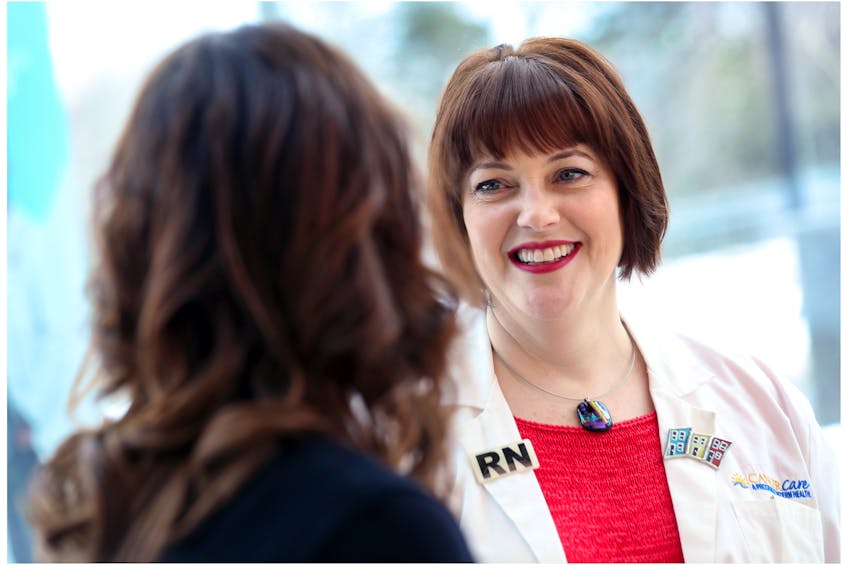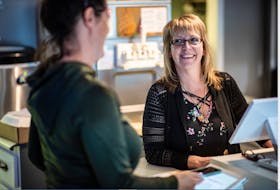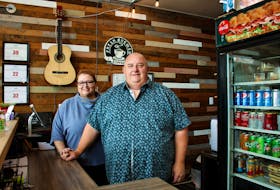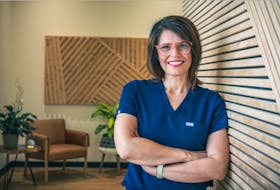People with cancer interact with a variety of professionals, between their family physician, a radiologist, a surgeon and an oncologist — but their Cancer Patient Navigator is there for them every step of the way.
“We’re able to be a consistent person throughout the whole process,” says Corrine Humby, a Registered Nurse and Navigator with the Cancer Care Program of Eastern Health. “It helps things to feel a little less ‘stop, start, stop, start’ because they can reach out to us anytime — at any point in their journey.”
Navigators are compassionate and effective guides that work with cancer patients and their families on their respective journeys. When a person first receives a cancer diagnosis, Humby says they’re overwhelmed.
“They don’t know what they’ve got, what the treatment plan is or what their prognosis is,” says Humby. “Their physician might have been talking about ‘biomarkers’ and ‘margins’ and they aren’t sure what all the terms mean.”
Humby says “filling in educational gaps” is a big part of being a Navigator, as they help people process the onslaught of information that comes with any new diagnosis.
“They’re emotionally charged and that impacts your ability to hear things, so after the patient’s had time to think about what the doctor said and discuss it with their family, we’re there to help it make sense,” says Humby.
She says Navigators work with patients to help them come to terms with their disease and understand what’s likely to happen next. They can also work with the patient’s family members and close friends who are struggling with the diagnosis.
“Loved ones often feel very lost. They want to help in any way they can, but they’re not sure exactly how to help,” explains Humby. “They often don’t understand what’s happening, either, but they’re also worrying about what to say and what not to say. It can be hard for them.”
Navigators are also patient coordinators. They check on referrals, follow-up on diagnostics, troubleshoot any issues and make sure patients know about the services and support systems available for them.
“A lot of times, people don’t understand what supports are out there,” says Humby. “We make sure they know about what’s available — financial help, counselling, nutrition help, support groups — so they can access them.”
This is something Humby says she wished she’d had more time to focus on in her previous oncology roles. She’s been a Navigator for almost eight years, but she’s worked in oncology for more than three decades. Navigators always have at least five years’ experience in oncology and come from surgical, medical or therapeutic backgrounds.
Patients can reach out to a Navigator at any point in their journey — even before it’s officially begun.
“I’ve had people call me saying ‘I just found a lump in my breast! What do I do?’” says Humby. “We can be there for them from that first suspicion of a malignant lump — which can cause a lot of anxiety — or we can step in anywhere during their journey if they feel they need us.”
Humby says sometimes patients don’t feel the need to lean on a Navigator until they’ve completed their surgeries and treatments and advanced into survivorship.
“They were propelling themselves from appointment to appointment, and it isn’t until it’s all over — and they’re coming out the other end — that they realize what they’ve gone through and that anxiety hits,” says Humby.
You don’t need to be a patient of the Dr. H. Bliss Murphy Cancer Centre to access the services of a Navigator. Anyone can self-refer by calling 1-855-848-3888 to be automatically directed to the Navigator in their region. There are currently Navigators in St. John’s, Clarenville, Central Newfoundland, Western Newfoundland, St. Anthony, Happy Valley-Goose Bay and Labrador City.
Once a person has connected with a Navigator, Humby says it can help them want to take a more active role in their own care.
“When you’re undergoing cancer care, you often feel like it’s happening ‘to’ you — but it’s important for other people not to take over for them,” says Humby. “When you’re informed, you’re able to be more proactive. You’re mindful of signs and symptoms and you’re able to intervene a little earlier.”
Since cancer patients often need to wait weeks or even months for their next visit with their oncologist, Humby says they sincerely appreciate knowing they can reach out to a Navigator any time they have a question or need a reassuring word.
“Just knowing they have access to us brings down a lot of their anxiety,” says Humby. “They know they have a helping hand along the way.”
To contact a Cancer Patient Navigator, please call: 1-855-848-3888 (toll free)
One in two people in Newfoundland and Labrador will be diagnosed with Cancer in their lifetime. The Dr. H. Bliss Murphy Cancer Care Foundation is proud to partner with the Cancer Care Program of Eastern Health. The Foundation is raising funds to build a new Chemotherapy Unit at the Dr. H. Bliss Murphy Cancer Centre. Please visit www.inthistogethernl.ca for more information on how you can support the In This Together campaign and help us enhance cancer care.









